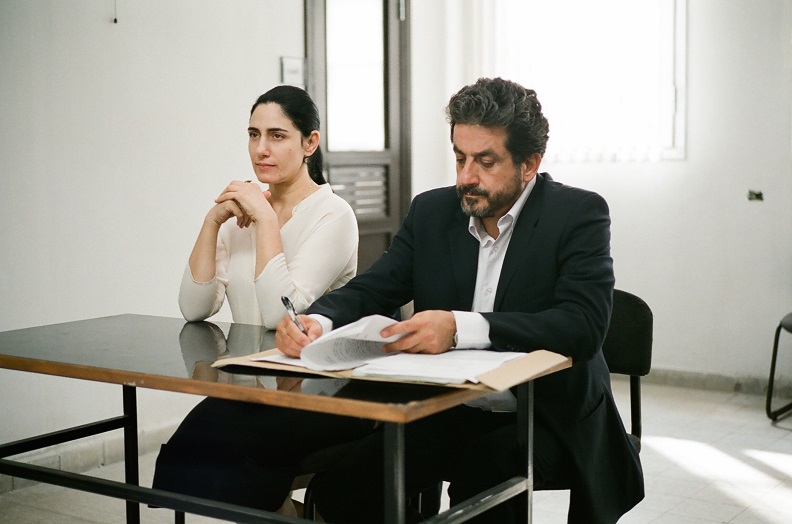Gett: The Trial of Viviane Amsalem
Director: Ronit Elkabetz
(iTunes)
A-
Though at times a bit awkward, a directing lead performer can yield either a covertly autobiographical or pleasantly organic film. Ronit Elkabetz, however, easily commits to both. Gett: The Trial of Viviane Amsalem — a journey through a failed, yet legally-bided marriage — serves as a joiner (and maybe opus) for the filmmaker’s 15-year catalogue of French and Israeli cinema. Gett, much like Blue Valentine or A Separation, is a film that, though catalyzed by a cultural institution, reaches far beyond the borders of any one nation.
Viviane (Elkabetz) vies for divorce from her husband, Elija (Simon Abkarian), after a marriage of 30 years, which pushes the two to a point of utter silence. Unfortunately, Hebrew law requires that a husband grants his wife permission to separate if no violence has occurred. Thus, Elijah denies Viviane leave for five years, forcing her to wade through a patriarchal and crippling bureaucracy. With the aid of her advocate Carmel (Menashe Noy), Viviane endures condescending criticism, at times humorous anecdotes, and the harsh reality of an antiquated system.
Ironically titled, Gett (“divorce”) brings us incredibly close to the mechanisms of a culture distant to many. However, the conversations had within its musky and barren courtroom are telling of far more than just a foreign society. In one instance, Viviane’s sister Rachel (Rubi Porat Shoval) is called in for an account of the couple’s marriage. In doing so, she tears into both Elija and the presiding rabbis, citing that men will often grow complacent and silent, forcing their wives to writhe in a union better illustrated as a corpse. Elija quickly and briefly removes himself from the front of the court while Viviane laughs uncontrollably.
Moments like these propel Gett beyond its inherent environment. Another example finds a neighboring couple of Elija and Viviane to provide individual accounts. The husband, a member of Elija’s temple, lauds the defendant as intelligent, handsome, and powerful in an attempt to dismantle Viviane’s grounds for divorce. However, when the husband’s wife takes to the podium, what begins as reassurance quickly turns into a rebuttal as weekly arguments are brought into question, quickly dissolving the courtroom into chaos. The conversations are so raw, real and actualized that personal quarrels become the preface for a systemic discussion.
Each performer’s work proves to be visceral, natural, and free within the single room the film is confined to, perhaps despite the subject matter. Often, dialogue grows heated and emotional, yet it never feels contrived. Gett seems to harp on the same chords that The Best Years of Our Lives did so many years ago.
Elkabetz, of course, commands the most attention with initially little speech. Her stern gaze, subtle body language, and an occasional laugh bookended by tears suggest a player just as in tune acting out roles as she is conjuring them. From the opening and temporarily first-person scene, Elkabetz commands attention without any utterance. Perhaps better than any performer in the last year, she encapsulates a fish trapped inside a bowl yet to be cleaned. Fortunately, she never flounders.
Gett is both moving and engaging, avoiding staleness while staying grounded. Serving as a great introduction into the realm of both conversation pieces and foreign cinema, it may inadvertently be a cause for celebration.





